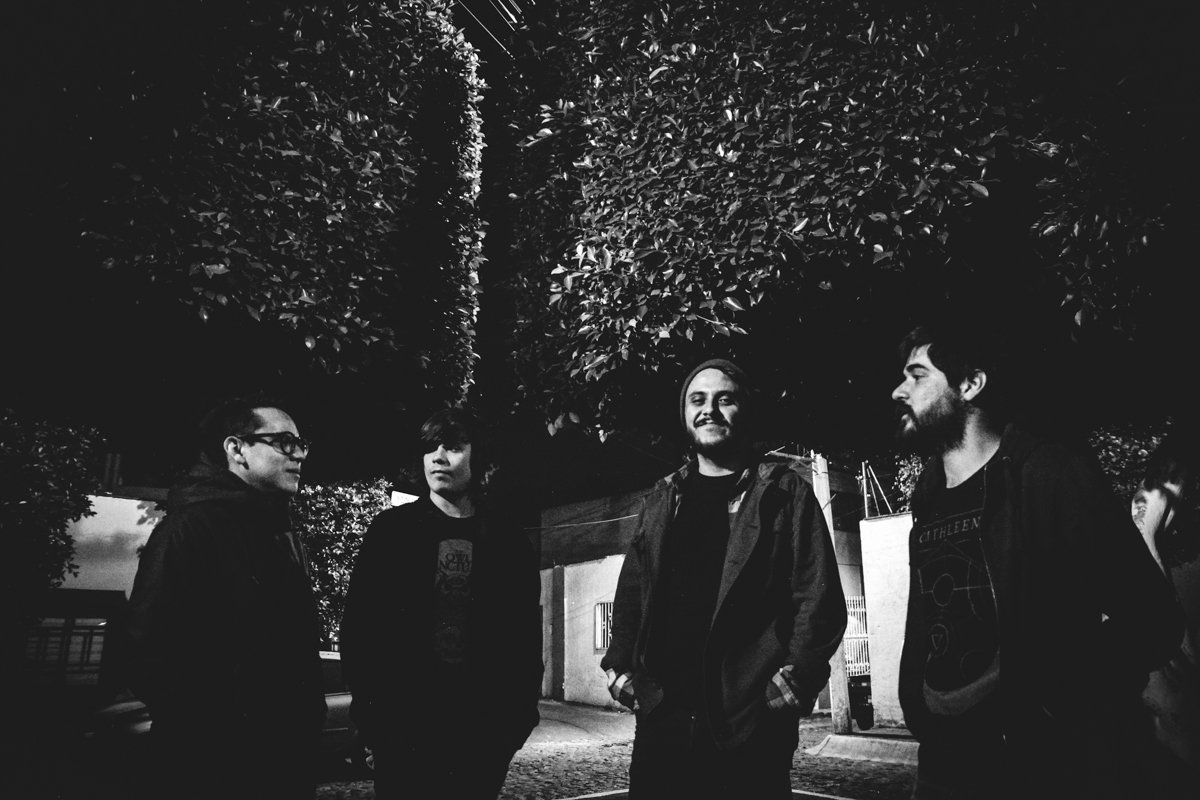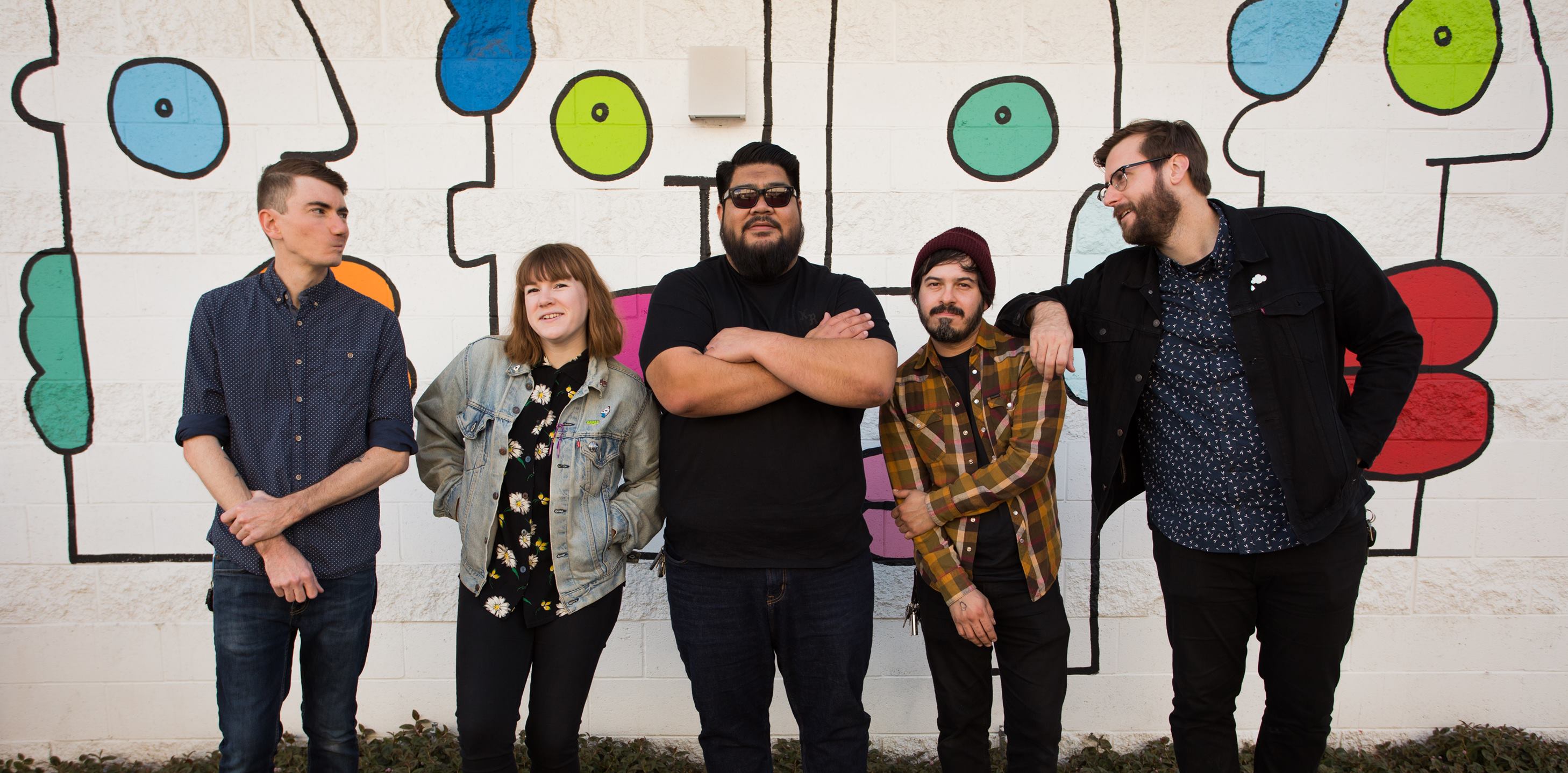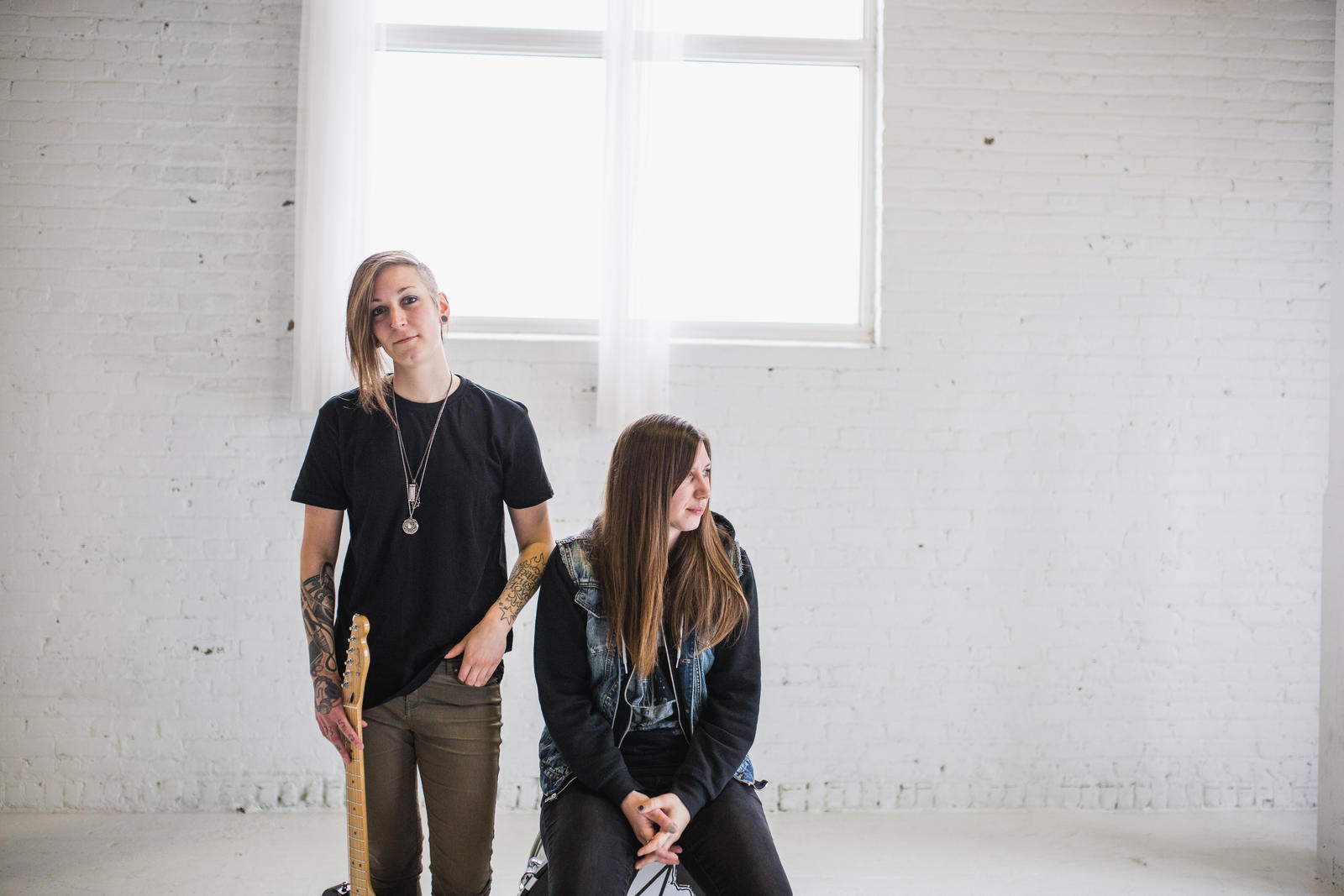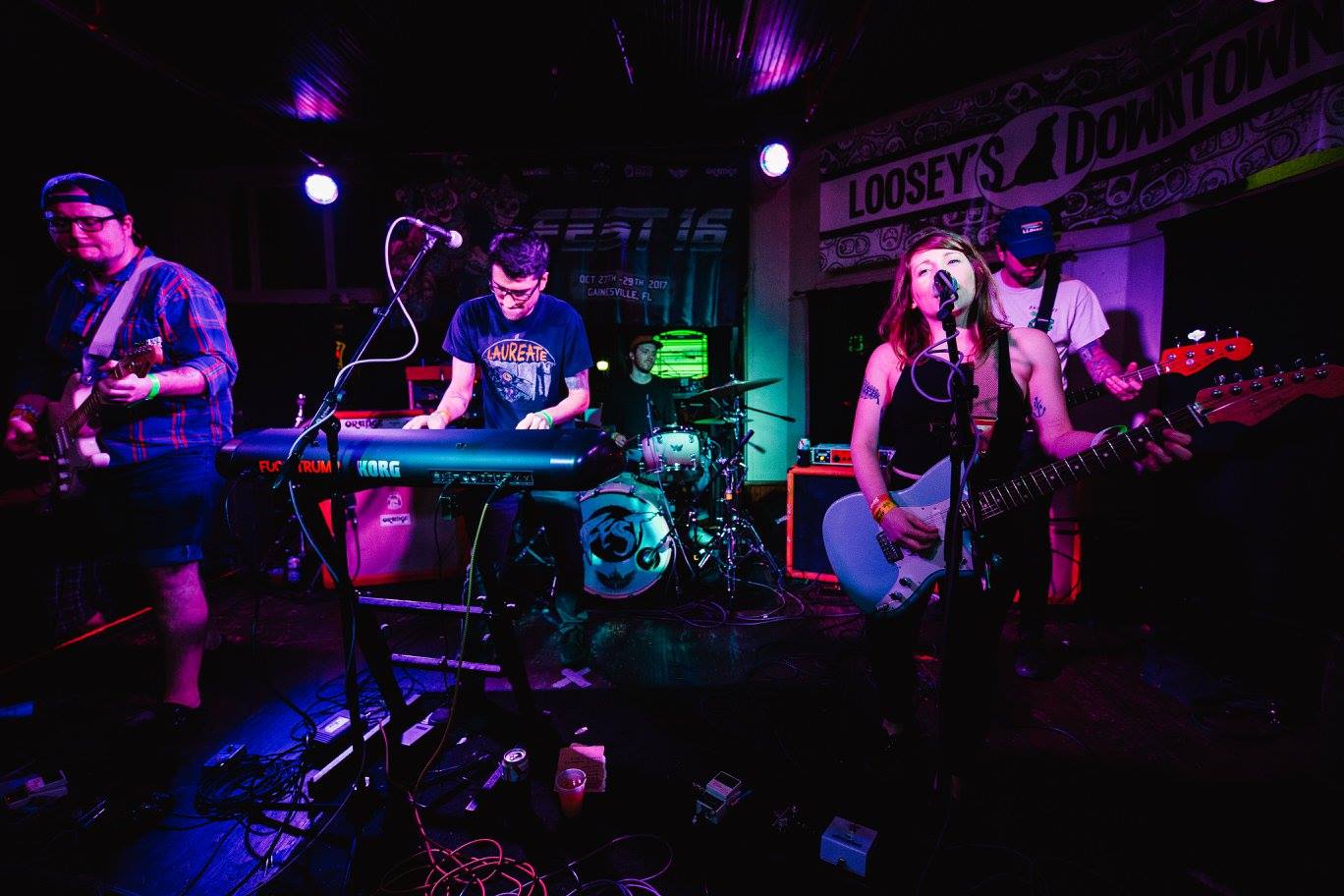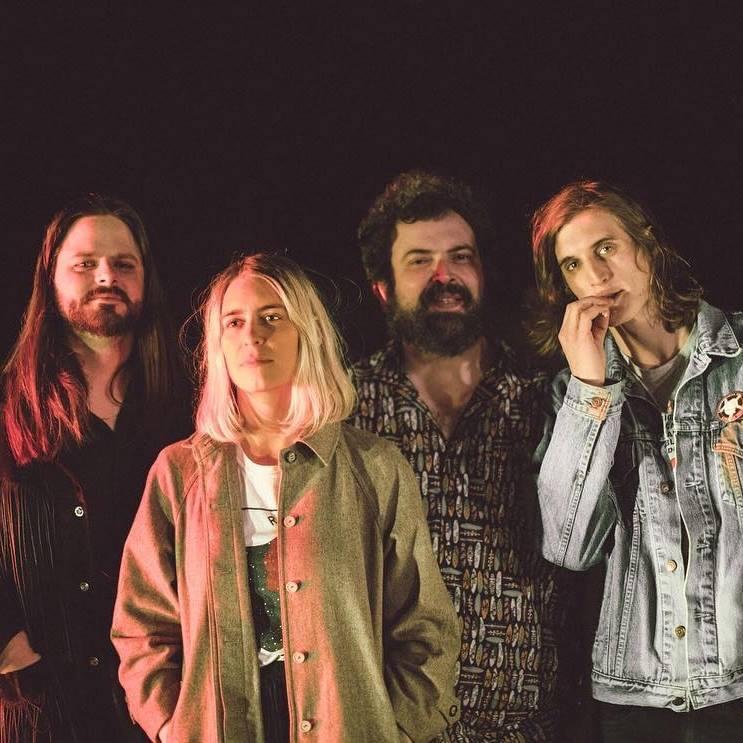Joliette are a Post-Hardcore band from Puebla, Mexico consisting of (f.l.t.r.) Azael Gonzales (drums), Fernando Obregòn (vocals/guitar), Juan Pablo Castillo (guitar) and Gastòn Prado (bass). Ahead of their show at Dynamo Werk 21 on June 25th, Milo Schärer of Radio Radius spoke with them about new releases, Mexico’s music scene and touring in Europe.
Milo Schärer: Hi guys, thank you so much for doing this interview with Radio Radius!
Fernando Obregòn: Thank you man!
Milo: If I’m not mistaken, this your third show on this tour, or…
Juan Pablo Castillo: No, it’s actually like…
Azael Gonzales: The third or fourth week.
Juan Pablo: We’ve been on tour since June 1st. We started in the UK, we were there for a week, and then we went to Sweden, Denmark and then down to Italy, and now we’re here this week for some shows in Switzerland, France and Germany. So yeah, we’re not even halfway through our tour, it’s two and a half months long. But so far, it’s been really good. It’s been cool to see how every place is different, you know? The UK is really different, and Sweden, Denmark, Italy… Every place has its own thing, things that we really enjoy. We’re really excited to do Switzerland.
Milo: Ok. For people who don’t know Joliette yet, how would you describe your band in five words?
Fernando: Five words, jeez…
Juan Pablo: Chaotic.
Fernando: Intense.
Gastòn Prado: Balanced.
Azael: How many do we have?
Fernando: Three.
Azael: Jazzy.
Fernando: Yeah, it’s kind of jazzy right now. And melodic.
Milo: You’ve also described your sound as “post-todo” in the past. What do you mean with this description?
Fernando: It’s a joke.
Juan Pablo: It started as a joke that went a little bit too far, I think.
Gastòn: The thing is, we were trying to avoid a certain label. To a certain extent, I think our music is kind of post-hardcore, but then again, it is not. If somebody asks us: “Hey, what type of music do you play?” and we say: “We play post-hardcore”, that might be a little misleading, you know what I mean? So, we just kind of came up with this post-todo term, to try to avoid the genre trap.
Azael: We listen, and we try to make our music based on what we like, for example Gastòn might really like The Dillinger Escape Plan or Converge, and Juan Pablo might really like Bon Iver. It’s two totally different genres, you know? I don’t know, we try to mix it, that’s why it’s post-everything.
Milo: What are some musical styles or bands that have influenced your music?
Fernando: We like Deftones a lot. Bands that we have in common, I guess that’s Deftones, Radiohead… We were listening to a lot of Radiohead yesterday.
Azael: The Mars Volta.
Fernando: At The Drive-In as well.
Gastòn: The Dillinger Escape Plan, for sure. Converge.
Fernando: What else? I think those are the ones that we have most in common. Maybe Glassjaw, a few other hardcore and screamo bands. It’s a long list, but I’d say all of our sound tries to incorporate some things that we’ve taken as influences from the bands we just mentioned.
Milo: Ok. You released the 7” El Alphabiotista recently. Could you tell us a bit about this song?
Fernando: Well, it’s part of an album that we already finished recording. It’s our third LP. This is the first song that we chose as a single from that album, and since the past couple times we were here in Europe, we were playing the same record, so we figured it was time to bring something new over here. We were lucky enough to meet Gab from Epidemic Records, he really liked our music and supported us by putting out El Alphabiotista on a 7”. About this song, I think it’s one of the heavier ones on the record, definitely. It’s a song that talks about fear of death and paranoia, all that stuff. I feel like from touring over and over again you gain some sense of awareness about everything that sometimes gets too loud in your head, you know? There’s a lot of things that resonate with me personally now that I’ve been able to tour over and over again in the same places, and you develop anxiety, so I just wanted to put that out there on that song. So, it’s a pretty emo song, probably.
Milo: You also released something else recently, a live split with Frameworks. How did that happen?
Juan Pablo: Frameworks went on tour in Mexico, in October of 2016. We love those guys, we really like Frameworks, we’ve known them for quite some time. When we’d visited the United States, we’d played with them a couple of times before, so we became friends. Then, at that time the opportunity for them to visit Mexico arose, and with it a two-week tour. Talking about music during these days, we found out that we liked the same kind of stuff, so at one point we we’re like: “We should do something!” The idea was to do a battle set, one band in front of the other, playing at the same time. And it happened, we found a studio, we found the time to do it, and the guys from light and noise records, which is a record label from Mexico, did it all. It was sitting there for almost a year, then we decided to put it out on video, and the tape release was just to have another release to give it its place and not just keep it on video.
Milo: You’ve released a lot of splits with other bands, such as Life in Vacuum, as well. What do you like about releasing music this way?
Gastòn: The thing is, we really like writing songs and playing new music, we’re very addicted to that feeling of having new ideas. Sometimes you don’t have the time to write a full-length album, but you have the desire and the drive to make songs. So, we just make a few songs together and look for any type of excuse to release it with other bands. And also, there’s a lot of bands that we’ve met and we really like their music, and it just happened, that we talked about a split. For example, with Life in Vacuum and ZagaZaga from Israel, it just clicked and we had the right songs for doing that. Actually, we’re looking forward to continue doing that, we really like releasing songs that way.
Azael: Well, I’m new in Joliette, I’m one year old in this band, but as an outsider, one year ago, I saw Joliette as the band that connected music from other parts of the world with Mexico. We’re used to listening to US bands, for example, a couple of European bands, but I noticed that Joliette was doing stuff with bands from other parts of the world, like Israel, Switzerland, Canada, it’s interesting. And now that I’m part of the band, I’m looking forward to what’s going to happen next. Maybe we can go to Australia or Japan.
Milo: You’ve been a band since 2011, if I’m not mistaken. Could you just briefly tell us the story of how you decided to form Joliette?
Fernando: Juan Pablo and I used to play together in another band in our hometown, Puebla, that was more than 10 years ago, like 12 years ago. We met sometime around 2004, and then two years later, we decided to form a band. After that band, we just kept on talking, and then we decided to try again and make it a bit more serious, to record stuff with decent quality and go on tour, try to make as much as we can out of the band. By that time, I already knew Gastòn, and Juan Pablo and Gaston were long-time friends, they’ve known each other since way, way back. In that sense, everything connected, we’ve had two drummers before Azael. Since we formed, I guess a lot of things have changed, not only lineup changes but also the sound and style, we’ve changed a couple things.
Milo: As you say, you’re from Puebla. Could you tell us a bit what the punk/hardcore scene is like there and in Mexico in general?
Juan Pablo: Well, in Puebla specifically the punk/hardcore scene is not that big, so that’s actually why we decided to move to Mexico City. In Mexico in general it comes and goes in waves. It also changes places, there’s sometimes an area where there are lot of bands for four or five years, and then they just kind of disappear, and then in another area of the country, bands start playing. So, it’s really interesting how the places where the bands are from affect the sound of the movement that’s going on at the moment. But in general, Mexico City is the place where everything happens. You have shows every week, you have every genre of music going on, you have festivals going on, and the interaction between bands is a big part of why we decided to move the band to Mexico City. I think Mexico has a lot of really good bands out there, bands doing really interesting stuff, but touring there is kind of hard. Sometimes it’s really hard to get out of that same area, that’s why a lot of bands stop playing, or they just go on hiatus for a while. So, it really depends what year your talking about, what bands sound like. So, I’d say the scene in Mexico is always moving.
Milo: Are there any bands in particular that you are into at the moment?
Fernando: Yeah, there’s one we all like called Cardiel. Actually, they’re from Venezuela but they’ve been living in Mexico for the past 10 years. They’re a duo…
Juan Pablo: A two piece. It’s skate punk, stoner rock and dub jams. It’s quite weird, but it’s a combination that works. Yeah, they’re definitely one of our favorite bands. I always say that Azael used to drum for a really cool band that I like, it’s called Annapura, they play power-violence. I don’t know, there’s quite some more that I really like that are not playing anymore. There was this band from Tijuana called Walle, really good.
Azael: Apocalipsis, from Mexico City. Their guitar player moved to the Czech Republic, but sometimes they play. Who else? Nazaremo el Violento…
Gastòn: Amber is a cool new band.
Azael: Amber is a math rock band, they really jam, their bass player is 15 or 16 years old and it’s just crazy…
Gastòn: Who else? Corporeal, they’re from a city called Tampico and they’re also really cool.
Azael: Point Dexter, that’s a new one. That’s one of my drum students, but that band play really well.
Gastòn: Also from Mexico City, El Shirota.
Azael: There’s a big scene over there, it’s a big city with many people in it, so yeah.
Juan Pablo: The thing is, all of these bands play with each other, so it’s easy if someone’s interested in getting to know that. I’m pretty sure if you listen to us, you’ll get to another one, it’s easy to connect them. Even though the scene is big, at the same time it’s really small and we all play with each other.
Milo: Thanks for all those band suggestions, I will definitely check those out.
Fernando: Yeah, we can give you a long list if you really want to check all those bands out, there’s good stuff there, definitely.
Milo: This isn’t your first European tour, you also played at Obenuse Fest II and III for example, how did opportunities for extensive tours here arise for you?
Gastòn: The first one was actually pretty weird, pretty unusual. It was thanks to the guys from ZagaZaga, they wrote to us because they saw one of our music videos and they liked it, and we just started talking about how it would be cool to do European tour and then it happened. That was in 2015 and thanks to people we got to meet, we were able to do it again. We can explain further…
Juan Pablo: It’s been four years of a lot of work put into coming here. For us, coming from Mexico, it’s always a big investment, getting a plane ticket and a band van. Here in Europe, people are really listening to us and they’re getting more and more into the band, so every time we come, we see a better response from people. For us, it’s been a good investment to come here every year. The kind of music that we play, there’s a lot of people in Europe who are more open to that. We’ve been playing wherever we can, getting to know bands. We also really like to invite bands from Europe to go to Mexico, so that exchange has been working really well for us.
Milo: What European bands have you toured with in Mexico?
Juan Pablo: We took Überyou from Zurich. Who else?
Fernando: Aren’t they the only ones? Oh yeah, Birds In Row, from France. The Prestige, also from France. We played a festival with Totoro from France but we didn’t bring them to Mexico, they were touring and we also played a show with them. I guess those are the only European bands we’ve taken to Mexico.
Milo: Are there any major differences between playing shows in Mexico and in Europe?
Juan Pablo: Yes.
Fernando: Well, the hospitality here is quite nice.
Azael: I think it’s just different, it’s not better or worse. I mean, it’s obvious that maybe in America, and Mexico specifically, we’re not that used to having bands from other parts of the world. Mexico is really big, so it’s Mexican bands. The hospitality is different, it’s not bad, I don’t know how to explain it.
Fernando: It’s more suitable for it’s own economy, the level of hospitality, in that case. But what I mean is that here, it’s a bit easier to get a good place to sleep and you get fed at almost every show. Everything runs way more strictly here, in a good sense. I also think that the crowd have a bigger relationship with this kind of heavy music. In Mexico, there’s quite a lot of people that listen to heavy music, but I think there’s more here.
Azael: People are more used to listening to hardcore music over here, or maybe not used to, but they know about how it works.
Juan Pablo: For me, a big difference is the venues. In Europe, you have a lot of youth centers or smaller venues for hardcore or punk. In Mexico, that’s probably the hardest thing to find, a proper venue.
Fernando: There are pretty much no good small venues. All venues are bigger and it’s practically impossible for an underground band to get a show there.
Juan Pablo: Also, what I really like in Europe is groups or collectives making shows. People getting together to bring in a band, someone makes food, someone takes care of the audio. That’s really cool, you don’t see that so often in Mexico. Of course, there are groups like that, but there’s always two in each city and here in Europe you have 10 or 12 making those things happen. That’s really important, because sometimes in Mexico the hardest thing is to find a place for a show.
Milo: I believe you’re also playing one other show in German-speaking Switzerland this summer. Do you want to tell our readers about that?
Juan Pablo: In July, we’re playing in Bern with Clowns.
Fernando: And the other one is Kreuzlingen.
Juan Pablo: We’ve been in Bern before, this is going to be our third show there. We love Bern, and in general, we like how people react to our music here in Switzerland. We’ve been lucky enough to visit a lot of cities here, maybe 10 or more, in the past years, and we love it. We like the people here, we’re really good friends with the Überyou guys, and they’re always sweethearts, they always treat us super well. We really love to be in Switzerland in general, people here are super warm and they really are into our music.
Joliette Links:

